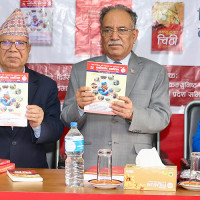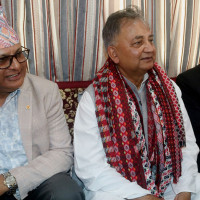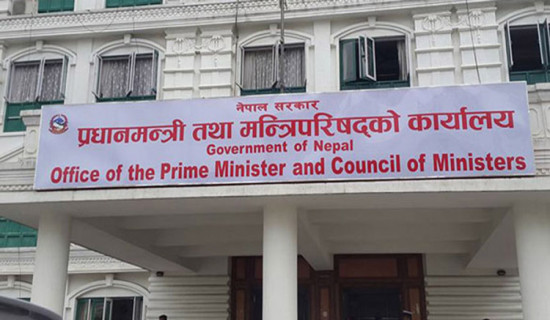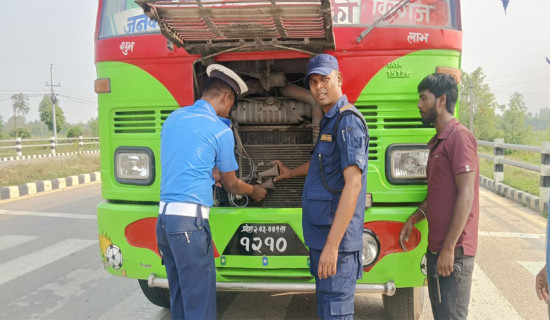- Sunday, 19 May 2024
‘Nursing colleges do need to have a 100-bed hospital’
By Nayak Paudel,Kathmandu, Nov. 2: Seventy-three of 109 colleges providing Proficiency Certificate Level (PCL) Nursing courses under the Council for Technical Education and Vocational Training (CTEVT) have been closed after being unable to operate their own 100-bed hospital.
“Section 12 of the National Medical Education Act, 2017, states the need for a 100-bed hospital for nursing and dental colleges. The colleges earlier provided the PCL course with as many as 50-bed hospitals. The college operators are dissatisfied,” said Khagendra Prasad Adhikari, vice-chairperson of the CTEVT.
While the colleges have been closed, more and more Nepali students are going to Indian colleges, claimed Adhikari while addressing a discussion programme organised by the Parliamentary Committee for Education, Health and Information Technology in Singha Durbar on Wednesday.
The CTEVT has been in a tussle with the Medical Education Commission (MEC), which was formed under the National Medical Education Act after the provision of a 100-bed hospital was enforced strictly during this academic session.
After the closure of over 70 nursing colleges providing the PCL course, the college operators took the matter to the streets in September. But they called off the month-long protest after Mohan Bahadur Basnet, Minister for Health and Population, assured to meet their demands.
Since then, Minister Basnet has been claiming that the country required more nurses and that preventing old colleges from providing nursing education was a wrong step taken by the MEC.
“Nepal needs 29,000 nurses now. However, the trend of Nepali students studying nursing abroad is increasing. We may need to hire nurses from abroad to meet the demand in the near future,” said Minister Basnet when he addressed a programme in Kageshwori Manohara Municipality on October 11.
However, contradicting the claims of the CTEVT and Minister Basnet, among others, officials at the Nepal Nursing Council (NNC) and Nursing Association of Nepal (NAN), two of the major stakeholders of the nursing sector, stressed that the country was not in the state to operate more nursing colleges.
“If the provision to have its own 100-bed hospital led a nursing college to shut down, it is not wrong. Moreover, 75 per cent of the beds should often be occupied by patients,” said Sarala KC, chairperson of the NNC.
KC added, “Until September 23, Nepal had 78,496 nurses. How many more do we need? Have all of the nurses received a quality job? How much are they earning? Why are more nurses going abroad for work? How to retain the nurses? These are the issues we should be talking about. We do not need more substandard nursing colleges.”
“We have seen graduated nurses injecting medicines from outside a sweater. Many do not even identify basic medical equipment in license exams. If we continue prioritising the production of nurses without being concerned about their quality, we will suffer more,” said KC.
Mana Kumari Rai, president of NAN, said that a nurse needs to acquire at least 1,520 basic skills to be a quality nurse. “The skills can be learnt by practising. It is why a nursing college needs its own hospital of at least 100 beds,” Rai added.
Moreover, Rai and KC argued that the provision of a 100-bed hospital was proposed by the nursing bodies 14 years ago.
“It was in 2008/09 that the nursing colleges were asked to have a 100-bed hospital. They were given a three-year time at first and it was extended further by two years. Many of them have not constructed the hospital even in 14 years. Why should they still be allowed to produce poor manpower?” questioned Dr. Anjani Kumar Jha, vice-chairperson of the MEC.
The parliamentary committee informed that the discussion was conducted to collect feedback and suggestions on affiliation, admission and quality of CTEVT and medical education. The committee plans to recommend the government and the parliament for necessary amendments in the existing laws to solve the prevailing issues in the sector.
“Nursing education is not viewed seriously. While some government officials say that the country does not have enough nurses, they are also making diplomatic agreements to send Nepali nurses abroad. Nurses are given a monthly salary of Rs. 8,000 to a maximum of Rs. 20,000 by big private hospitals. The government has not increased job opportunities in government hospitals. Yet, there is a discussion on how to produce more nurses. When are we going to discuss ways to produce quality nurses and retain them?” said KC.
Supporting the statements of KC and Rai, Dr. Bhagawan Koirala, who is also the chairman of the Nepal Medical Council (NMC), said, “Doctors are nothing without nurses. The produced nurses should be properly trained, educated and experienced. Increasing nursing colleges is not the way to ensure quality nurses.”
Responding to the concerns, Ashok Kumar Rai, Minister for Education, Science and Technology, and Dev Kumari Guragain, Secretary at the Ministry of Health and Population, said that the government was taking steps to ensure quality education and retain the nurses within the country.



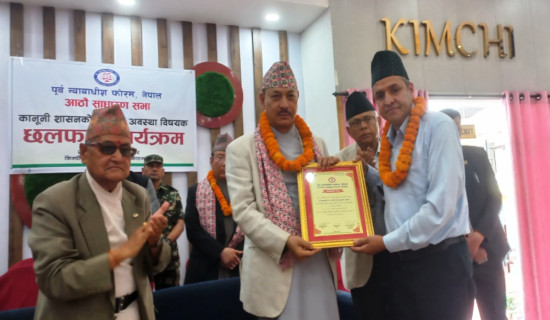
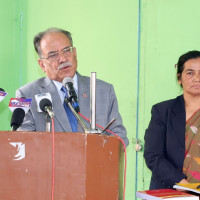
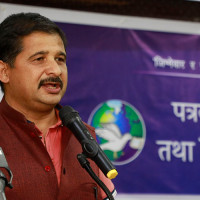
-original-thumb.jpg)
